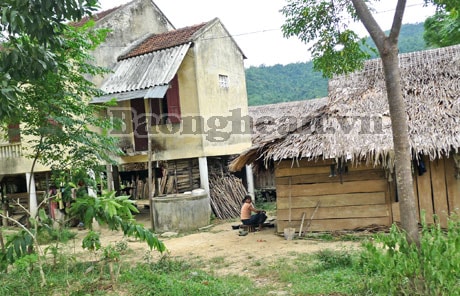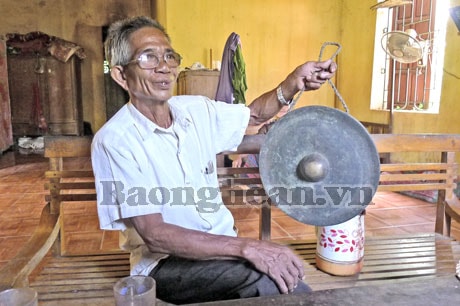Cultural identity in resettlement areas - Fear of fading away
(Baonghean) -After 6 years of moving to a new place, along with stabilizing the economic life of the people, preserving the cultural identity of ethnic groups in the resettlement area is posing many concerns for the local government.
Coming from the reservoir to the resettlement areas, the people's lives are difficult in many ways: The land for production is not enough and unstable, they are not used to the new farming methods. Resettlement houses and infrastructure systems are quickly degraded and damaged. There is no market yet. Up to now, the people's lives are still not stable because the above difficulties have not improved much. When food and clothing are still a constant concern, the story of people taking care of preserving cultural values has become distant...
Coming to Thanh Son commune (Thanh Chuong) to learn about the situation of preserving and promoting the cultural identity of the people in the resettlement area, Vice Chairman of the People's Committee - Vi Trong Thuy said: "The government is interested in mobilizing people to preserve traditional cultural activities, but gradually it has faded away. Only a few elderly people know how to write, the young generation is lazy to speak Thai but only likes to speak Kinh. Food and clothing have also changed a lot. Now people mainly wear ready-made clothes, the whole commune only has a few houses with looms.
No one weaves brocade, so the image of women in colorful dresses remains only in old memories. There are few organizers of the culture of rice wine. Those who hold the performance lines and ritual incantations have also gradually forgotten. Love songs and antiphonal songs can only be held on Tet. Thai culture is always closely linked to rivers and streams, but down here the rivers are dry and the streams are small, so the inspiration for artists' creations has gradually dried up.

The "new style" stilt house is built of bricks and cement.
With a deep longing for the beauty of ancient culture, we expressed our desire to meet the rare artisans who represent the culture of an entire ethnic group. Comrade Thuy hesitated: “There is Mr. Lang Gia Tuyen in Cha Coong 1 village, who wrote poems set to music in ancient Thai melodies. Mr. Luong Van Tien in Kim Chuong village, who preserves musical instruments and songs. Regarding the gong culture of the Khmu people, there is Mr. Kham Chan in Thanh Hoa village. I am afraid that they are busy going to the forest, to the stream, and are not at home.”
Asking the villagers, we learned that Mr. Tuyen and Mr. Tien had not heard any poetry or music for a long time, because they were worried about food and clothing and had no one to listen to them. As for Mr. Tuyen, perhaps partly because he was sad that his youngest son was one of more than 10 drug addicts in the commune, he had no interest in writing or reading poetry. When we got home, it was just as comrade Thuy had said, Mr. Tuyen and Mr. Tien were catching snails and going to the forest, not knowing when they would return. We only met Mr. Kham Chan sitting and whittling bamboo under the stilt house.
He spoke intermittently, not knowing whether it was because he was busy working or because he was ashamed and sad when "The gongs were sold out. People from the lowlands came up to buy them for 10 million VND each, but because there was no rice to eat, they had to sell them." When asked about gongs, Mr. Moong Duc Thang, former Secretary and Chief of Kim Da village (old) who lived right next to Mr. Kham Chan's house, invited us to his house to see the male gong that his family kept as a treasure. He said that in the entire village of 81 households (2/3 of whom were Khmu), only one pair of male and female gongs remained, to play on holidays and New Year, to celebrate the New Rice. The sound of the gong echoed for a while and then faded away, as if the stilt houses nestled under the coconut trees of Kim Da village appeared in his eyes for a moment and then faded away...

Mr. Moong Duc Thang with the only remaining male gong in Thanh Hoa village, Thanh Son commune, (Thanh Chuong).
Also in the above situation is the cultural decline of the O Du people in the Vang Mon resettlement village, Nga My commune, Tuong Duong district. As one of the oldest but smallest ethnic groups in our country (more than 600 people), the O Du people are currently losing and losing their cultural identity for many different reasons. In this resettlement area, it is almost impossible to distinguish between the stilt houses of the O Du people and the stilt houses of the Thai people. (The stilt houses of the O Du people in the past had 2 staircases, now there is only 1 staircase like the houses of the Thai people).
Village chief Lo Van Tinh shared his happy and sad stories: “From the lake to the new place, the O Du people learned many things from the Thai people such as how to raise animals, trade, and even customs and language. Previously, the O Du people did not have the custom of celebrating Tet, but now they do. They learned a lot and lost a lot, gradually their customs and language followed the Thai and Kinh people. The O Du language in the whole village is now only spoken fluently by about 5-6 people, all of whom are elderly people aged 60 and older.” Young people like Ms. Lo Thi Phuong, Mr. Tinh’s daughter, only know and speak about 30-40% of the O Du vocabulary, even though she has attended a language class organized by Nghe An province in collaboration with the Department of Culture of Tuong Duong district. O Du children now mainly speak Thai, Kho Mu and Mandarin.
Talking about the decline of ancient customs, there are both positive and negative aspects. Take the wine culture as an example: According to Mr. Moong Duc Thang, the Khmu people used to drink 5 or 6 jars of wine at their weddings, but now they learn from the Kinh people to do it more quickly, only 1 or 2 jars for worship and drinking, not eating and drinking lavishly day after day. Thus, the wine culture is gradually being forgotten because the people themselves realize that they need to change to have a more progressive and scientific life. When returning to the resettlement area, contact and interaction with other ethnic groups leads to the absorption of new things and the elimination of old things for a more progressive and developed life, which is inevitable. That is the subjective reason that makes people "change" themselves, sometimes excessively leading to "losing" their identity. The objective reason is that the difficult economic life makes people not have the time and mind to preserve traditional activities (usually festivals and ceremonies).
Vice Chairman of Thanh Son Commune People's Committee - Vi Trong Thuy said: "The commune has 16 villages with 1,137 households, 4,902 people including Thai and Khmu people, the poverty rate is still up to 86.79%. Not familiar with the farming methods here, people only know how to grow cassava, but this year is the third year, so the soil is infertile, the cassava does not produce tubers. Growing acacia takes 5, 6 years to harvest, many households grow acacia and then lock their doors and go back to their hometowns to make a living. We coordinated with the leaders of Tuong Duong district to encourage people to sign a commitment to return to the resettlement area. The commitment was signed but until now, people have not returned.
Here, the difference between poor households and households that have escaped poverty is sometimes only 10 thousand dong, but the subsidy regime is completely different, so everyone volunteers to be poor households and refuses to admit that they have escaped poverty! As long as they are hungry and poor, where will they get the mind to dance and sing? The difficult economic life not only negatively affects ancient customs and practices but also affects cultural, educational and social life in general. Illegal migration makes it difficult for authorities at all levels to control, and children who follow their parents to make a living have to drop out of school.
What is the solution to the alarming loss of ancient cultural identity in resettlement areas? This question makes village elder Kha Thien Phuc, former Chairman of Huu Duong commune, Tuong Duong district (old), now in Nhan Pa village, Ngoc Lam commune, constantly ponder: “We, the elderly, are very worried: the culture of our ethnic group will be lost when we come here, so we often stand up to propagate and mobilize people, educate teenagers and children to be aware of preserving culture. The village requires women to always wear Thai skirts; at village meetings, singing and dancing are organized. Preservation should start from educating the young. For example, in schools in resettlement areas, there should be a rule that on Mondays, students must wear traditional costumes of their ethnic group. In addition, there should be programs to teach ethnic languages and music.”
Mr. Luong Quang Ba, Vice Chairman of Ngoc Lam Commune, Thanh Chuong District, said: "It is necessary to have an economic development strategy for people in resettlement areas with many specific tasks. Only with food can we uphold morality, hunger and poverty will also erode culture. In addition, we need help from all levels and sectors in preventing social evils and drug addiction in resettlement areas. Most of the addicts are young, protecting cultural values is not the sole responsibility of the elderly." Mr. Vi Trong Thuy also hopes that "the province and district will create financial conditions for resettlement communes to establish cultural and artistic clubs."
We left behind the resettlement areas with their “stilt houses” that were hybridized, mixed with cement, dashboards, and mortar, and could not help but wonder: Blending into the flow of time and the flow of “Kinhization”, will the Thai, Khmu, and O Du people that we met lose their traditions, and also lose themselves? Of course, the authorities have a great responsibility in preserving the cultural values of the nation, when the people here have left their homeland following the government’s persuasion for the benefit of the community. But, their own responsibility is also extremely great because the culture of a nation will truly disappear when that nation does not have the awareness to preserve itself.
Thanh Son - Hai Trieu






